Untash-Napirisha
Untash-Napirisha was king of Elam (in present-day southwest Iran) during the Middle Elamite period, circa 1300 BCE. He was the son of the previous Elamite king, Humban-Numena. He was named after Napirisha, an Elamite deity.
| Untash-Napirisha | |
|---|---|
| King of Elam | |
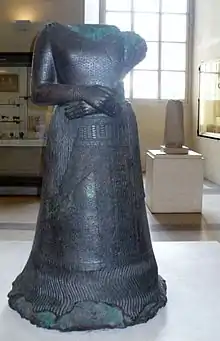 Statue of Napirasu, wife of Untash-Napirisha. Inscription: "I, Napir-Asu, wife of Untash-Napirisha. He who would seize my statue, who would smash it, who would destroy its inscription, who would erase my name, may he be smitten by the curse of Napirisha, of Kiririsha, and of Inshushinka, that his name shall become extinct, that his offspring be barren, that the forces of Beltiya, the great goddess, shall sweep down on him. This is Napir-Asu's offering."[1] | |
| Reign | circa 1300 BC |
| Predecessor | Humban-Numena |
| Successor | Kidin-Hutran |
He founded and built extensively a new city, Dur-Untash, 40 km SE of Susa, modern Chogha Zanbil. He built extensively in this city, and its main temple, the famous Ziggurat, still stands there.[2] Although construction in this religious city complex abruptly ended after Untash-Napirisha's death, the site was not abandoned, but continued to be occupied until it was destroyed by the Assyrian king Ashurbanipal in 640 BC.
Untash Napirirsha also left numerous building inscriptions for more than 50 temples and buildings, either built or renovated during his reign, in Chogha Zanbil, Susa, Choga Gotvand and other places.[3]
A later Elamite letter from Berlin Pergamon Museum (VAT17020) mentions that he married to “the daughter of Burna-buriash (a Babylonian king) and she bore him a son (and the future Elamite king) Kidin-hudurdish (Hutran)".[4] If this was the Babylonian king Burna-Buriash II, then the reign of Untash-Napirisha could be dated ca 1340–1300 BC. However, some scholars consider a different model for the synchronism between Kassite dynasty in Babylone and the Elamite kings, and suggest that the mentioned Burna-buriash was a later prince, and that the reign of Untash-Napirisha could be dated ca. 1275–1240 BC; see, for example The Berlin Letter, Middle Elamite Chronology and Sutruk-Nahhunte I’s Genealogy.[5]
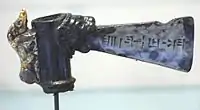 Axe bearing the name of the king Untash-Napirisha.
Axe bearing the name of the king Untash-Napirisha.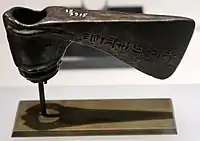 Axe inscribed with the name of King Untash-Napirisha
Axe inscribed with the name of King Untash-Napirisha The Ziggurat at Chogha Zanbil was built by Untash-Napirisha.
The Ziggurat at Chogha Zanbil was built by Untash-Napirisha.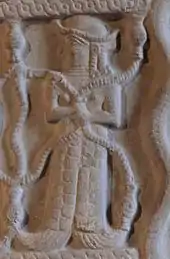 Fish-tailed deity holding snakes. Stele of Untash Napirisha, sandstone, ca. 1340–1300 BC, brought from Tchoga Zanbil to Susa in the 12th century BC.[6]
Fish-tailed deity holding snakes. Stele of Untash Napirisha, sandstone, ca. 1340–1300 BC, brought from Tchoga Zanbil to Susa in the 12th century BC.[6]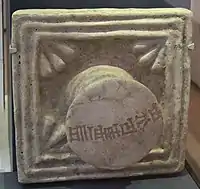 Plaque with inscription "Palace of Untash-Napirisha" from Chogha Zanbil
Plaque with inscription "Palace of Untash-Napirisha" from Chogha Zanbil
References
- The Archaeology of Elam: Formation and Transformation of an Ancient Iranian State. D.T.Potts, second edition
- Elizabeth Carter, Matthew W. Stolpe. Elam: Surveys of Political History and Archaeology p. 37
- .T.Potts (1999). The Archaeology of Elam. Cambridge University Press. pp. 213–216.
- .T.Potts (1999). The Archaeology of Elam. Cambridge University Press. p. 208.
- J. Goldberg. The Berlin Letter, Middle Elamite Chronology and Sutruk-Nahhunte I’s Genealogy
- "Stèle du roi Untash-Napirisha, "roi d'Anzan et de Suse"". 2020.
| Preceded by Humban-Numena |
King of Elam 1340–1300 BC |
Succeeded by Kidin-Hutran |